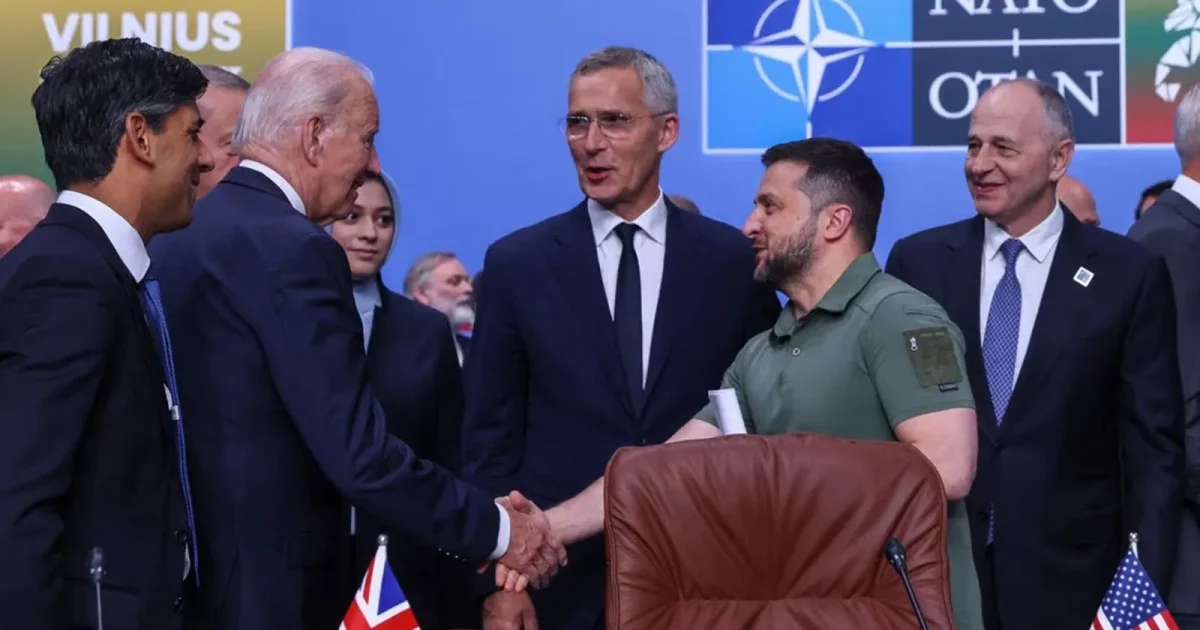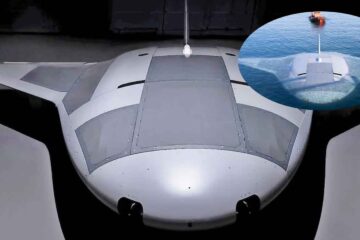
In a significant development at the NATO summit, the United States, Britain, and other global allies have announced enhanced security assurances for Ukraine. These measures are aimed at safeguarding the country against future attacks as it progresses towards becoming a member of the alliance.
This announcement comes after President Volodymyr Zelenskiy criticized NATO’s refusal to extend an invitation or provide a timeline for Ukraine’s entry into the alliance, describing it as “absurd.” Ukraine, which has been battling a Russian invasion since February 2022 resulting in numerous casualties and displacements, has been actively pushing for expedited NATO membership.
While an immediate invitation and timetable for membership were not granted, the G7, composed of the United States, Germany, Japan, France, Canada, Italy, and Britain, will issue a declaration outlining their commitment to supporting Ukraine in the years ahead. The declaration aims to bring an end to the ongoing war and ensure deterrence and response capabilities against any future attacks.
Practically, this will involve bilateral agreements between the G7 nations and Kyiv, focusing on long-term military and financial aid to bolster Ukraine’s armed forces and stabilize its economy. President Zelenskiy, although disappointed by the absence of a membership timetable, expressed overall satisfaction with the summit’s outcomes and welcomed the announcements of new military aid from allies. However, he emphasized the need for additional support and highlighted Ukraine’s requirement for long-range weapons during his meeting with U.S. President Joe Biden at the summit.
Jake Sullivan, the White House national security adviser, affirmed that President Biden would engage in open discussions with President Zelenskiy, providing a transparent explanation of NATO’s decision regarding membership. Sullivan acknowledged Zelenskiy’s strong views and the straightforward approach of President Biden in addressing them.
NATO, an alliance founded on the principle of mutual security guarantees, has been cautious about making firm military commitments to Ukraine, fearing that it could escalate tensions with Russia into a full-blown war. Given Russia’s previous violation of the Budapest Memorandum, an agreement that aimed to protect Ukraine in exchange for relinquishing its Soviet-era nuclear arsenal, Ukraine remains skeptical of less-binding security assurances.
NATO Secretary General Jens Stoltenberg, standing alongside President Zelenskiy, emphasized that Ukraine was closer to the alliance than ever before. Stoltenberg dismissed Russia’s warnings about the repercussions of supporting Ukraine, stating that Ukraine has the right to choose its own path, and Moscow cannot dictate its decisions. Stoltenberg stressed the importance of credible security assurances to deter future Russian aggression, while also highlighting the urgent need for additional weapons to bolster the capabilities of President Zelenskiy and the Ukrainian armed forces.
British Prime Minister Rishi Sunak clarified that the security arrangements for Ukraine were not intended as a substitute for full NATO membership. President Zelenskiy held bilateral meetings with the United States, Canada, Germany, Britain, Japan, and the Netherlands on the sidelines of the NATO summit in Vilnius to secure further military support for Ukraine’s counteroffensive.
To strengthen cooperation between Kyiv and the 31-nation alliance, the inaugural meeting of the NATO-Ukraine Council was scheduled for the same day. This new format aims to enhance collaboration and coordination between Ukraine and NATO.
NATO, established in 1949 to protect allies against potential Soviet Union aggression, previously engaged in the NATO-Russia Council in 2002 with the aim of improving relations. However, this engagement ceased after Russia’s annexation of Crimea in 2014 and its support for separatist forces in eastern Ukraine.
With Russia’s full-scale invasion in 2022, Europe finds itself grappling with the resurgence of Cold War-era tensions. NATO has made it clear that Ukraine cannot join the alliance while engaged in a conflict with Russia, and both Washington and Berlin have cautioned against actions that could lead to a direct confrontation with Moscow.
Advocates of Ukraine’s swift NATO accession in Eastern Europe and beyond expressed disappointment with the outcome of the summit’s first day. In response, Russia, viewing NATO’s eastward expansion as an existential threat, swiftly voiced its concerns. Dmitry Medvedev, Deputy Secretary of Russia’s Security Council chaired by President Vladimir Putin, warned that increased military assistance to Ukraine by NATO could escalate tensions to the point of a third world war.



